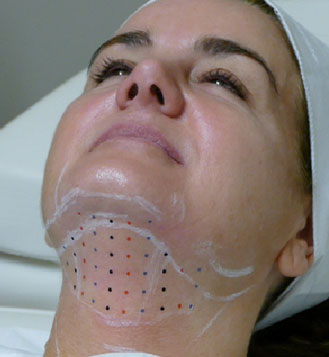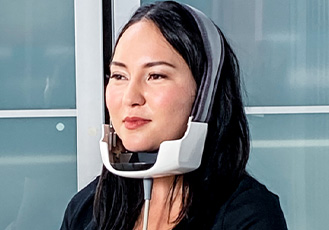
Few accomplishments are as rewarding as waking up in the morning and hitting your target weight. You've worked hard to drop those unwanted pounds all year long, and you deserve a huge round of applause for what you've accomplished. However, if you're like many men and women, getting the sleek, sculpted body you crave is easier said than done. You've got pockets of unwanted fat around your abdomen, thighs, chin, and other areas - fat that just won't go away, despite diet and exercise.
Wouldn't it be nice to just freeze that fat away and forget all about your love handles?
At Southern Cosmetic Laser, our new, revolutionary fat-freezing treatment can help you achieve the toned look you've been dreaming of. That's right - we're talking about literally freezing the unwanted fat off your problem areas without invasive surgeries or extended downtime.
This amazing treatment is called CoolSculpting, and it's the world's leading non-invasive fat reduction procedure. It's specifically designed for people already at their desired weight who want to push past that plateau for real body sculpting results. If you're tired of seeing that excess belly fat, saggy skin, or double chin, CoolSculpting is the procedure for you. Southern Cosmetic Laser offers a wide range of the newest technologies to target fat reduction, skin tightening, facial and body remodeling, body toning, and cellulite reduction.

Our Services
- CoolSculpting in Mount Pleasant, SC
- Southern Cosmetic Laser's CoolSculpting Procedure
- Top CoolSculpting Treatment Areas
- Questions About CoolSculpting? We've Got Answers
- Popular Treatments That Complement CoolSculpting
- Discover CoolSculpting Precision and Unlimited Beauty with Southern Cosmetic Laser
Services Area

What is CoolSculpting?

CoolSculpting is an FDA-approved procedure that has undeniable results. With CoolSculpting, you can permanently get rid of your muffin top, fat around your flanks, and more, all from the comfort and convenience of the Southern Cosmetic Laser office.
Technically known as cryolipolysis, CoolSculpting has the ability to reduce the number of fat cells in targeted areas between 20 and 25%. This unique technology uses controlled cooling to freeze and eliminate fat with minimal recovery time. No needles, no scalpels, no liposuction. Just real results provided by a licensed, experienced professional.
While CoolSculpting helps eliminate fat cells in your body, it doesn't harm the surrounding skin and muscles. Instead, it treats fat that is directly under the skin, also called subcutaneous fat. Since CoolSculpting doesn't target visceral fat deposits, this treatment works best for men and women who are approaching or already at their desired weight.
CoolSculpting is approved by the FDA to help reduce fat in the following areas:
- Flanks
- Outer Thighs
- Upper Arms
- Inner Thighs
- Chin
- Back
- Belly and Abdomen
How Does CoolSculpting Work?

CoolSculpting results are noticeable, proven, and long-lasting, helping you look your best and feel great from every angle. This exciting procedure works because fat cells freeze at higher temps than other tissues. As such, CoolSculpting delivers controlled, targeted cooling to do away with unwanted fat underneath your skin. These fat cells are essentially frozen or crystallized and eventually die. With time, your body will process that fat and will eliminate the dead cells, leaving behind a more sculpted physique.
Here are some quick CoolSculpting facts at a glance, so you have a better idea of why this fat cell elimination treatment is so popular:
- There is no prep time required for CoolSculpting from Southern Cosmetic Laser.
- Patients can expect some very minor discomfort during the procedure. Many patients report no discomfort at all.
- There is little-to-no downtime needed after your CoolSculpting procedure is complete.
- It may take up to 12-16 weeks to see your final results.
- This procedure eliminates fat permanently!

Southern Cosmetic Laser's CoolSculpting Procedure

Our CoolSculpting procedure is crafted around your comfort, with one-on-one attention in a relaxing atmosphere. It all starts with a detailed assessment, which you will complete prior to your treatment. This assessment will help us better understand your goals and desires, so we can freeze away the stubborn fat from the areas that matter most.
Typical CoolSculpting appointments take about an hour per area, though that time varies with each patient. Because our CoolSculpting applicators use a vacuum system to help with placement, you may feel a pulling sensation in the targeted area. Once placement is complete, we get to work on freezing your fat.
Before treatment, your skin is prepped with an alcohol wipe. A gel pad is then placed on your treatment area to help protect your skin. From there, a cold sensation is delivered through our applicators, which are designed for specific body parts.
Because there is no sedation involved with CoolSculpting, we encourage you to kick back, relax, and watch a little TV. If you prefer, you can also read or use your phone to check your favorite social media sites. Our friendly, experienced CoolSculpting technicians strive to keep you as comfy as possible during this quick treatment. When it's over, you can resume normal activities as soon as you like - there's no recovery or downtime to worry about!


Top CoolSculpting Treatment Areas

CoolSculpting procedures are perhaps best known for eliminating stubborn belly fat, giving the patient a desirable, contoured tummy. However, this treatment is also very effective on other areas of your body:
CoolSculpting for Your Double Chin
While neck fat usually goes hand-in-hand with weight gain, symptoms like double chins can appear even if you're not overweight. CoolSculpting helps solve neck fat problems by eliminating fat cells in the area below your chin, giving you a slim, youthful appearance.

CoolSculpting for Unwanted Belly Fat
Many men and women begin CoolSculpting treatments to destroy fat around the abdomen or midsection. CoolSculpting does so by freezing stubborn subcutaneous fat in the abdominal region, resulting in a trimmed-up tummy. Remember, CoolSculpting does not treat visceral fat, or the fatty tissue surrounding the organs in your abdomen.

CoolSculpting for Your Back
Back fat is a serious problem for many people in the U.S. This includes the upper back (where fat rolls over the bra), the mid-back (near the waist), and the lower back (where fat bulges over the beltline). Back fat can be hard to tone, but with CoolSculpting from Southern Cosmetic Laser in Mount Pleasant, it's more than possible.

CoolSculpting for Your Upper Arms
When it comes to stubborn fat, your upper arms are often the most difficult areas to treat. If you are constantly trying to hide your upper arms from friends and family, CoolSculpting is an excellent option to help overcome your insecurity.

CoolSculpting for Your Love Handles
Sometimes called saddlebags or flanks, love handles are the flabby areas that protrude from your hips. Love handles are often caused by fat retention over long periods of time. They can appear very pronounced in tight clothing, leading to feelings of embarrassment. Common factors that contribute to love handles are age, slow metabolism, hormones, and diets high in sugars and fats. With Southern Cosmetic Laser's CoolSculpting, patients leave behind stubborn love handles, helping them achieve a slimmer, more fit appearance.

CoolSculpting for Your Thighs
If you are in good shape but suffer from chafing or discomfort due to fatty thighs, your solution could be at Southern Cosmetic Laser. Our technicians can help freeze away inner thigh fat, so you feel proud to wear skirts, shorts, and bikinis.


Questions About CoolSculpting? We've Got Answers
Q: Does CoolSculpting really work?
A: Yes! Southern Cosmetic Laser wouldn't be one of the most trusted providers of the treatment if it didn't work. According to recent statistics, CoolSculpting treatments can reduce fat reduction by as much as 25% in the affected area. Contact our office today for your initial consultation, where our team will advise you on how many treatments you need to meet your goals.
Q: How much does CoolSculpting cost?
A: Pricing varies depending on the areas you focus on and how many sessions you need in order to reach your goals. Our team will craft a custom treatment plan specific to you during your initial CoolSculpting consultation.
Q: How quickly will I see results?
A: Many patients can see results as soon as three weeks after their first CoolSculpting procedure in Mount Pleasant. As your body continues to dispose of crystallized fat cells, you can see even more changes with time.
Q: Does CoolSculpting eliminate cellulite?
A: CoolSculpting is designed for fat reduction. However, it may help contribute to cellulite reduction in specific treatment areas. There are currently no FDA clearances for cellulite reduction with CoolSculpting. However, our office offers incredible treatments like Inmode Evolve to reduce the appearance of cellulite and trim, tighten, and tone your skin.
Q: Why should I choose Southern Cosmetic Laser for CoolSculpting in Mount Pleasant?
A: Southern Cosmetic Laser is a CoolSculpting certified practice and has completed advanced training at the CoolSculpting University. With a highly-trained staff of medical professionals, we're one of the leading providers of CoolSculpting in South Carolina. We know that peace of mind is precious these days. That's why we're committed to you and your body contouring transformation every step of the way.
Popular Treatments That Complement CoolSculpting

We are a full-service practice offering Medical Aesthetics and Cosmetic Dermatology services. As such, Southern Cosmetic Laser has several innovative treatments that complement your CoolSculpting procedure. Whether you're looking to tighten up that turkey neck or say goodbye to cellulite, we've got a custom treatment option waiting for you.


Cellulite Treatment with Sentient Sculpt
Southern Cosmetic Laser is Mount Pleasant's first medical aesthetics practice to offer Sentient Sculpt. This exciting new product reduces fat, remodels skin tissue, and regenerates skin collagen, leaving your skin tight and smooth.
Using microwave technology, Sentient Sculpt uses up to 80% of the energy generated to penetrate fat under your skin. This process destroys fat cells and the fibrous bands that cause dimples, or cellulite. The remaining 20% of energy is used on the upper layers of your skin, tightening and contracting it to improve its overall appearance.
Sentient Sculpt benefits include:
- Long-Lasting Results
- Improved Skin Laxity
- Effective Skin Tightening & Fat Reduction
- Fat Cells Permanently Destroyed
- Younger Looking Skin
- Minimal Discomfort
- Built-In Cooling for Maximum Comfort
Contact Southern Cosmetic Laser today to learn more about the benefits of Sentient Sculpt and how it can be paired with CoolSculpting treatments.

Kybella for Your Double Chin
If you're ready to kiss that double chin goodbye, Kybella could be the solution you need. Kybella is a treatment that deoxycholic acid that breaks down fat cells when injected into the treatment area. It provides noticeable results for improved chin profile.
Kybella Benefits Include:
- Permanent destruction of fat cells
- Quick treatment process
- Patients may see results in 2 to 4 treatments

Facial Remodeling with Inmode Evoke
Inmode Evoke is the first and only FDA-approved, non-invasive product for facial remodeling treatment. Evoke offers tightening and lifting for facial rejuvenation and can help you achieve a more defined neck and jawline.
The Evoke Intelligence System regulates temperature and sense impedance every millisecond, providing remarkable results. Using proven bipolar radiofrequency energy, Evoke sub-dermally remodels your facial tissue. The Evoke technology offers precise, consistent power to achieve optimal results.

Tite, Trim, & Tone with Inmode Evolve
This advanced, state-of-the-art Thermal Body Contouring Technology helps to trim, tighten, & tone your skin at the same time. Evolve's cutting-edge tech can destroy fat, reduce cellulite, and tighten skin. The result? A newfound, youthful appearance and feel. This treatment is perfect for your mommy makeover, eliminating muffin tops, sculpting abs, and addressing fat around your thighs, belly, arms, legs, hips, and knees.
Benefits of Inmode Evolve include:
- Tone and Tighten Skin
- Eliminate Fat Cells
- Reduce Crepey Skin
- Reduce Saggy Skin
- Collagen Stimulation for Improved Skin Elasticity
- Smooth Over Stubborn Fat Pockets
- Even Out and Reduce Skin Irregularities
Contact Southern Cosmetic Laser today to learn more about the benefits of Inmode Evolve and how it can be paired with CoolSculpting treatments.

Discover CoolSculpting Precision and Unlimited Beauty with Southern Cosmetic Laser
When it comes to unmatched patient care and body contouring services in Mount Pleasant, no other practice comes close to Southern Cosmetic Laser. We pour passion into every service we offer, from non-surgical fat cell freezing to laser hair removal. If you're looking to make a change for the better this year, we're here to make your wishes a reality. Contact our office today to learn more about the stunning benefits of CoolSculpting technology. Before you know it, you'll be excited to show off that new bathing suit or bikini on the beach.
 843-277-2240
843-277-2240
Free Consultation
Latest News in Mount Pleasant, SC
$2.4B deal buys 3 South Carolina hospitals, including Mount Pleasant facility
Ross Nortonhttps://charlestonbusiness.com/2-4b-deal-buys-3-south-carolina-hospitals-including-mount-pleasant-facility/
Listen to this articleThree area hospitals have been sold in a $2.4 billion deal to North Carolina-based Novant Health by the previous owner, Tenet Healthcare of Dallas, Texas.The sale of East Cooper Medical Center in Mount Pleasant, Hilton Head Hospital in Hilton Head and Coastal Carolina Hospital in Hardeeville includes the associated physician clinics and other operations, according to a news release from Novant Health.“We are beyond thrilled to welcome our new team members...
Listen to this article
Three area hospitals have been sold in a $2.4 billion deal to North Carolina-based Novant Health by the previous owner, Tenet Healthcare of Dallas, Texas.
The sale of East Cooper Medical Center in Mount Pleasant, Hilton Head Hospital in Hilton Head and Coastal Carolina Hospital in Hardeeville includes the associated physician clinics and other operations, according to a news release from Novant Health.
“We are beyond thrilled to welcome our new team members and grow our presence in South Carolina,” said Carl S. Armato, president and CEO, Novant Health, which is headquartered in Winston-Salem. “Novant Health’s long-term vision is to transform the health and wellness of these communities through expanded specialty services and clinical expertise. We are energized and united behind our cause to create a healthier future together by building connections with patients and clinicians in coastal South Carolina.”
The East Cooper Medical Center includes 15 physician clinics. Hilton Head Hospital includes the Bluffton Okatie Outpatient Center and 12 physician clinics. Coastal Carolina Hospital in Jasper County includes the Tidewatch Free-Standing Emergency Department in Bluffton, according to the news release.
Novant Health said continuity of care is a priority and appointments and procedures will continue as scheduled during the transition period. “We are working closely with our new Novant Health team members to ensure a seamless transition for patients and team members,” Joel Taylor, market CEO of Hilton Head Regional Healthcare, said in the release. “We are eager to move forward together in support of our teams and know decisions will be made with our community’s needs at the forefront.”
“There’s a lot to be excited about when planning for our future,” Tyler Sherrill, CEO of East Cooper Medical Center, said in the release. “Novant Health is known for elevating clinician leadership to provide patients with a trusted health care experience through world-class technology, personal connections and convenient access to care.”
Tenet Health also owns a cluster of imaging centers and urgent care clinics in York, Rock Hill and Fort Mill, but those South Carolina properties were not part of the deal for the coastal hospitals.
“We understand that taking care of our patients starts with taking care of our people, so I’m delighted to join a leadership team that strives to not only be a healthc are provider of choice but also an employer of choice,” Ryan Lee, CEO of Coastal Carolina Hospital, said in the release. “I look forward to expanding the resources available to our team.”
Novant Health supports health and wellness programs in the community, including health education/screenings, community health workers and mobile cruisers. Each year, Novant Health provides hundreds of programs that serve patients, neighbors and some of their communities’ most vulnerable citizens, the company said in the release.
The Novant Health network consists of more than 1,900 physicians and more than 38,000 team members who provide care at more than 800 locations, the release said.
Meet the candidates: Mark Flannery
Anna Sharpehttps://www.postandcourier.com/moultrie-news/news/meet-the-candidates-mark-flannery/article_bd6465d0-621e-11ee-bf7c-e7d85259d6ab.html
Tell me about your professional background and how you feel it makes you a good fit to be a council member.I've been teaching in Charleston County since 2016. This is my 24th year teaching. The local aspect of teaching, most of my career has been in teaching elementary school, but still the local aspect of working in the community where I live has always been something that I really like. Now I'm in North Charleston, so it's the greater community where I live. I think this is a theme of why I've chosen to run for Town...
Tell me about your professional background and how you feel it makes you a good fit to be a council member.
I've been teaching in Charleston County since 2016. This is my 24th year teaching. The local aspect of teaching, most of my career has been in teaching elementary school, but still the local aspect of working in the community where I live has always been something that I really like. Now I'm in North Charleston, so it's the greater community where I live. I think this is a theme of why I've chosen to run for Town Council because I would like to see Mount Pleasant make its own decisions on a local level and be responsible for them and with citizens participating in the process. I lived in France for seven years and I have a Bachelor of Science in French and psychology and a master's degree in educational technology. I've just always been part of the local community and have worked well with others.
What do you feel is the biggest issue facing the town today, and what plans do you have to address this?
I have a daughter, a six-year-old, and we went to James Island yesterday to go rock climbing in James Island County Park. I would like to see the green spaces improved in Mount Pleasant to make it something where travelers don't have to go across town to go to the (County) Park. I know that there’s a bike path in … Laurel Hill County Park and just a dirt road going in a half-mile circle and there are things that we can put back there that would be places you can take your kids and take your family.
The other thing is I think that health all across the United States is a problem. We pay more for healthcare. We have more healthcare issues related to obesity and diet. I would like to be somebody who spreads the message of healthy eating and healthy lifestyles lead to better lives. We have a great little local market there at Boone Hall...we have the Farmers Market on Tuesday and Boone Hall is open the rest of the week.
The results of the Public Input Matters survey found that throughout all seven districts in town, respondents feel that traffic in Mount Pleasant needs to be improved. What are some concrete solutions that you feel can address this?
The traffic in Mount Pleasant and housing in Mount Pleasant — I don’t know if ‘victims of our own success’ is the right word for it. We have a very unique geography here. We are a virtual island in that there's no shortcuts. There's one way in and one way out. You may come across I-526 or I-26 or you go north towards McClellanville and Georgetown up (Highway) 41. There just isn't room.
Today's Top Headlines
I know that the Town Council has a plan and they've already hired a company to look into certain traffic solutions. As a new council member, I'm not sure if I would be able to offer anything different to what they have already decided on.
Another area Public Input Matters survey takers responded to was housing availability. Forty-one percent of respondents felt that affordable housing options should be increased. How do you feel this can be accomplished?
I think it speaks well to the people in Mount Pleasant that we want things for people like affordable housing, but whether or not there is a feasible solution to providing that affordable housing — where are we going to put affordable housing? It makes sense that people want affordable housing but do they want the affordable housing in their backyard?
I want to live locally, I want to buy locally, want to shop locally, but we can't escape the fact that a lot of our local decisions are made on a state and national and global level. How does Mount Pleasant make affordable housing when the interest rates are 7.75 percent? There are things happening on a national level that we just can't control that can make our job of creating affordable housing next to impossible.
Is there anyone who has served as a role model to you, either from politics, past experiences or family members, that you look to and consider while you run for office?
Mount Pleasant to expand attainable housing options
Jordan Cioppahttps://www.counton2.com/news/mount-pleasant-to-expand-attainable-housing-options/
MOUNT PLEASANT, S.C. (WCBD) – Twelve acres of land along Park Avenue Boulevard in Mount Pleasant could soon be the site of a proposed attainable housing complex.“It is in the perfect place in Mount Pleasant ‘cause there’s six schools around there, t...
MOUNT PLEASANT, S.C. (WCBD) – Twelve acres of land along Park Avenue Boulevard in Mount Pleasant could soon be the site of a proposed attainable housing complex.
“It is in the perfect place in Mount Pleasant ‘cause there’s six schools around there, two fire stations, we’re getting ready to build a public services facility at Lieben Road, the hospital is there, and major retailers like Costco,” explained Mount Pleasant Mayor Will Haynie.
Next week town council will vote on the first reading of amending the Carolina Park Planned Development document to allow for attainable housing at that location.
The mayor said the proposed homes will be in the $300-400,000 price range and will be available for purchase, not rent. To qualify, he said future homeowners will need to fall within a certain percentage of the area median income.
“This is our first responders, our teachers, our healthcare workers. And to be a healthy and complete community, we need to welcome people like that instead of excluding them by the $1 million average home sale price we had last month,” Mayor Haynie said.
The parcel was purchased by Seacoast Church years ago for a second Mount Pleasant campus, but Glenn Wood, the administrator for the church, said they realized it wasn’t the right fit.
After receiving multiple offers, he said they decided to sell it to an attainable housing developer.
“We just feel like it’s a great opportunity for the town to be able to have housing that teachers, fire departments, nurses, you know and honestly even our staff ‘cause some of our staff has to live outside of Mount Pleasant and commute in just because of the cost of real estate,” Wood said. “And so, its an opportunity, we felt like for the town to be able to have some attainable housing and you know I think it’s a great use of the land and a great opportunity.
Prosperity Builders, the developer of the project, already has another attainable housing project in Mount Pleasant called Gregorie Ferry Towns.
Mayor Haynie said if the plan passes the necessary steps, they could break ground as soon as the summer.
How does Trader Joe's choose new locations? Here's what analysts say.
Anna Sharpe asharpe@postandcourier.comhttps://www.postandcourier.com/news/trader-joes-mount-pleasant-new-store/article_4d125956-c11c-11ee-9b9b-abcaa3c5e9e2.html
MOUNT PLEASANT — The saying goes that beggars can’t be choosers, and Trader Joe’s certainly doesn’t need to beg for business (if you've ever fought for a parking spot on a Sunday afternoon, you know).The California-based grocery chain has a reputation for being highly selective about where it opens new stores — even if that means choosing a second location a few miles fr...
MOUNT PLEASANT — The saying goes that beggars can’t be choosers, and Trader Joe’s certainly doesn’t need to beg for business (if you've ever fought for a parking spot on a Sunday afternoon, you know).
The California-based grocery chain has a reputation for being highly selective about where it opens new stores — even if that means choosing a second location a few miles from an existing one.
Trader Joe’s confirmed in January that Mount Pleasant will soon have not one, but two stores in town.
The announcement sparked excitement, praise and a fair amount of grumbling from outside fans of the grocery chain who believe their communities are more deserving of a new Trader Joe's location. A post about the chain's plans for Mount Pleasant drew more than 800 comments on The Post and Courier's Facebook page.
"This is the craziest decision," one reader groused. "Right around the corner basically from the current one...why not spread out a bit and go to James Island, West Ashley, N. Charleston or Summerville?"
"Do better Trader Joes," another demanded. "Two locations in the same area is preposterous."
As one might imagine, the news received a much more favorable reception in Mount Pleasant.
Tasha Blomquist and her son perused the floral offerings in front of the store on a cloudy morning. Blomquist said she stops by the store twice a week and is eager to see a new location, hopefully, in the northern part of town, where she lives.
“I live way in north Mount Pleasant, so I’m happy there might be one there,” Blomquist said. “I think it’s needed though because every time I’m here … I feel like you have to do multiple laps around the parking lot just to find a spot.”
Another shopper, Kelly Crowley, who lives near Brickyard Plantation, said opening a second store will hopefully cut down on crowds.
“We come by here pretty regularly. If you come here on Sunday or even Saturday, it’s lines all the way back into the aisle," Crowley said.
Though Trader Joe’s has not disclosed where the new store will be, multiple sources have told The Post and Courier the grocery chain is considering the old Bi-Lo building at the foot of the Isle of Palms Connector — a few miles from the store on Johnnie Dodds Boulevard that opened in 2011, and not farther into northern Mount Pleasant as customers like Blomquist would hope.
The proximity to an existing store seems like a head-scratching move — why does Mount Pleasant get two stores 5 miles apart, bypassing places like Summerville or West Ashley?
Demand for a Trader Joe’s in these areas is high, as evidenced by petitions that attract thousands of signatures calling for the chain to open the shop in their towns and cities.
One such petition from 2020 that called for a store in Summerville earned nearly 5,000 signatures. Another in West Ashley gained over 6,000.
Similar efforts also crop up in Myrtle Beach regularly. The city is one of South Carolina’s fastest-growing, yet you won’t find a Trader Joe's in the coastal municipality. Former Horry County Director of Planning David Schwerd said he had that conversation over and over during his 30-year tenure.
Today's Top Headlines
“'We need Trader Joe's. Everybody always wants a Trader Joe's. Pretty much every time a commercial rezoning or development planning comes up, it's usually the first one that gets mentioned,” Schwerd said.
Jeff Campbell, the University of South Carolina's department of retailing chair, said grocery stores, particularly Trader Joe's, are extremely strategic in opening new locations. You won't see a Trader Joe's on every corner, and they take their time scouting areas before settling on a city.
"Typically, they would use a variety of metrics in site selection, and while location is still an important consideration, they'll look at things like projected foot traffic, the demographics of the area, where the current transportation routes are, where competitors are located," Campbell said.
Myrtle Beach being a hot spot for tourists might not be attractive to the chain either. People who visit the coastal city are looking to stock up for the week, heading to Walmart or Costco for items in bulk, rather than prepackaged, single-serve foods, Campbell said.
People can request that Trader Joe’s consider their city for a new store. Nakia Rohde, a spokesperson for Trader Joe’s, said the company receives “tons” of requests for stores nationwide.
The company doesn’t share much about how it chooses the perfect site for a new Trader Joe's. But Schwerd has a hunch. He pointed to the region’s median income, age and education level — factors the grocer is thought to consider when choosing sites for a new store.
“They have their undisclosed lists of what they're looking for in demographics,” Schwerd said. “Even though Trader Joe's does not list any specific criteria in their evaluation, that's what they're looking for. They have an upscale, educated clientele.”
An interview with Joe Coulombe, the store’s founder and namesake, published in the LA Times in 2011 demonstrates this ideology that seems to have stuck with the company: “Unless you have enough well-educated people, Trader Joe’s will not work.”
Because of these factors, Schwerd said Horry County or Myrtle Beach are unlikely to get a Trader Joe’s any time soon.
According to U.S. census data, Myrtle Beach has a median income of $57,713, a median age of 51.5 years and 28.8 percent of residents who hold bachelor’s degrees or higher.
Mount Pleasant’s median age of 41.3 years is slightly higher than the state’s 40.5 years, but in Greenville and Columbia, where the other two Trader Joe’s are located, the median ages are much younger at 35.9 and 28.4, respectively.
“They want younger consumers, they want a little bit better-income consumers," Campbell said.
Mount Pleasant, where the median income is $114,237 and 66 percent of residents hold a bachelor’s degree, is far above the state’s median income level of roughly $64,000 and where 32.6 percent of the state hold bachelor's degrees.
So, Trader Joe’s wants to open stores in higher-earning areas with higher volumes of college-educated folks, and Mount Pleasant happens to fit the bill. It fits so well that shoppers will soon find half of South Carolina's Trader Joe's in town.
Campbell, who lives in Lexington, said he’d like to welcome a store in his city, but it’s not likely — it's just not what Trader Joe’s is looking for.
“They're not trying to sell to everybody. They're trying to sell to a particular demographic, and that demographic tends to do very well,” Campbell said.
Reach Anna Sharpe at 843-806-6790.
Friday is last day for Mt. Pleasant residents to weigh in on for multi-use trails
Destiny Kennedyhttps://www.live5news.com/2024/02/02/friday-is-last-day-mt-pleasant-residents-weigh-multi-use-trails/
MOUNT PLEASANT, S.C. (WCSC) - Residents of Mount Pleasant can still provide input on a road improvement project on the Rifle Range Trail and Long Point Trail.The Charleston Moves organization wants Mount Pleasant residents to weigh in on these designs before it’s too late.The Town of Mount Pleasant hosted an in-person meeting to collect community input on the proposed Rifle Range Trail and Long Point Trail segments as part of the Mount Pleasant Way project.For those who could not attend the meeting, online surveys ...
MOUNT PLEASANT, S.C. (WCSC) - Residents of Mount Pleasant can still provide input on a road improvement project on the Rifle Range Trail and Long Point Trail.
The Charleston Moves organization wants Mount Pleasant residents to weigh in on these designs before it’s too late.
The Town of Mount Pleasant hosted an in-person meeting to collect community input on the proposed Rifle Range Trail and Long Point Trail segments as part of the Mount Pleasant Way project.
For those who could not attend the meeting, online surveys are set for residents to vote on.
The goal of the project is to provide safe and efficient infrastructure for everyone to get around the town.
Questions that are featured on the survey ask if the concept is supported and what amenities residents would like to see included in the projects like benches, swings, water fountains and workout stations.
The Long Point Trail would provide continued access between the river crossing and neighborhoods.
The Rifle Range Trail is a proposed multi-use path project that is proposed to run along the west side of Rifle Range Road from the roundabout at Venning Road to Bragg Drive.
Friday is the last day to share your input and click to complete the survey for the Rifle Range Trail and Long Point Trail segments.
Copyright 2024 WCSC. All rights reserved.
Disclaimer:

